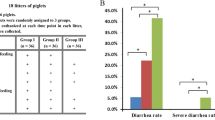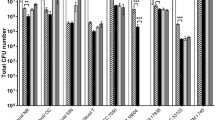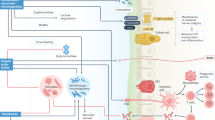Abstract
THE idea of using micro-organisms as food supplements is now commonplace, and a great deal is known about the use of yeast and Chlorella. Experimental work carried out recently at these laboratories suggests that equal, if not greater, possibilities exist in the use of Bact. coli cultures. These researches have been concerned solely with the effect of the addition of Bact. coli to basal diets, and no attempt has been made yet to ascertain the biochemical background of the results.
This is a preview of subscription content, access via your institution
Access options
Subscribe to this journal
Receive 51 print issues and online access
$199.00 per year
only $3.90 per issue
Buy this article
- Purchase on Springer Link
- Instant access to full article PDF
Prices may be subject to local taxes which are calculated during checkout
Similar content being viewed by others
References
Roberts, R. S., Nature, 165, 494 (1950).
Author information
Authors and Affiliations
Rights and permissions
About this article
Cite this article
ROBERTS, L. Bact. coli as a Food Supplement. Nature 172, 351–352 (1953). https://doi.org/10.1038/172351b0
Issue Date:
DOI: https://doi.org/10.1038/172351b0
This article is cited by
Comments
By submitting a comment you agree to abide by our Terms and Community Guidelines. If you find something abusive or that does not comply with our terms or guidelines please flag it as inappropriate.



